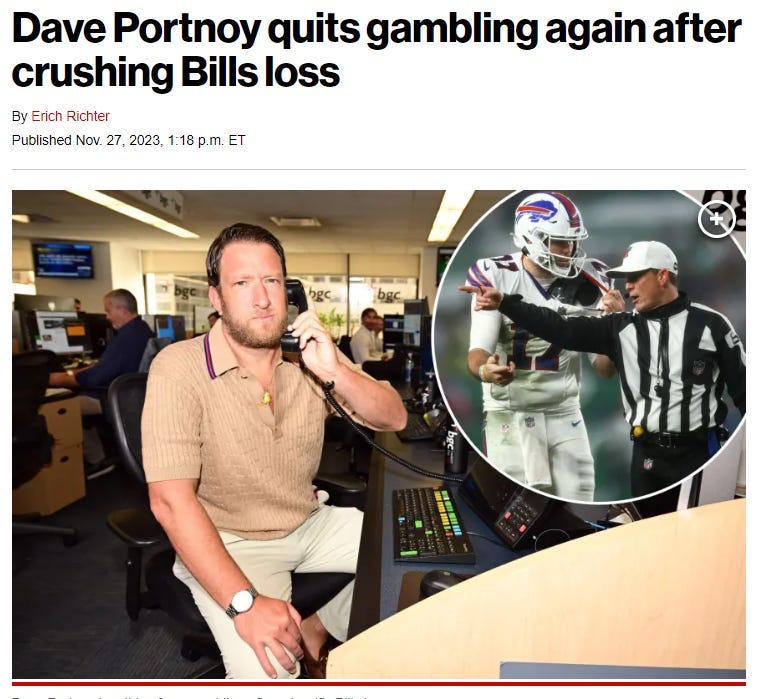Why the Betting Industry Targets Young Men
Flashy ads exploit psychology and demographics to hook customers.
I published an article in Persuasion on Wednesday exploring how legal sports betting rose to unchallenged prominence in the United States.
In 2018, the Supreme Court’s 6-3 decision in Murphy v. National Collegiate Athletic Association struck down the 1992 congressional ban on sports betting championed by two-time NBA champion and then-U.S. Senator Bill Bradley, who thought overturning the ban would prove to be a big mistake. If you’re not already familiar with the broad contours of how betting came to be legal in 38 states, I’d encourage you to go read the piece.
What’s happened since 2018 shouldn’t come as a surprise, because you’re living it.
Sports betting has become deeply normalized, and so has its ubiquity. Unbidden odds, enticements, and celebrity-driven advertisements are plastered everywhere. And it's not really a secret who these commercials are aimed at: Men, mostly young and often suffering—typically, of men in their 20s—from an acute awareness of their status in society.
It’s normal for your twenties to be a period of (often painful) growth, but the story these days seems to be that men are struggling more than usual. Falling rates of male post-secondary enrollment seem to bear this out (Richard Reeves has written a lot about this, and I reviewed his book here). Nobody should feel compelled to finish college, but our society isn’t particularly good to those who don’t. The near-term result is lots of directionless men with time and energy to spare.
Here’s where betting comes in. And it asks a simple question: “What if you could change your fortunes overnight?”
“The truth is, you’ve won too much,” Vince Vaughn tells Tom Brady in a recent Super Bowl ad for BetMGM. “Let others have their turn.” (NHL legend Wayne Gretzky also pops in, for good measure).
“The crown is yours,” promises one DraftKings spot aired during the 2022 Super Bowl, featuring the comedian Kevin Hart.
Neither commercial admits the possibility of failure. But I can hear you thinking: “Hold up—surely only idiots don’t realize you’re taking a risk by definition? That’s what betting is. ‘The House always wins.’”
True, except that to play in many cases is literally to win, because the first bets most users will place are genuinely risk-free promotional offers. There’s also bonus bets, site credit, deposit matches, profit boosts, rewards programs, referral bonuses and more. Every single advertisement makes such offers.
Why so generous? Luckily, the McBrodie rolodex is full of knowledgeable folks with expertise to share. Here’s one:
From a financial perspective, the initial flurry of free bets and boosted odds are just a part of what these companies term “customer acquisition cost,” or CAC. In a nascent American sports betting industry, the gameplan is to invest heavily in marketing, advertisements, and promotions now—with the eventual goal of lowering their CACs over time as their market shares grow and their customer retention rates increase.
Some will take their free bets, pocket the money if they win and quit on the spot. Many, many more will play the free bet and, no matter if they win or lose, find they’ve acquired the taste and play again. Then they’re off to the races. The truth is companies offer these promotions because they’re proven to pay off.
Our correspondent agrees:
They're positioning themselves for the long-run—they don't think they're going anywhere, and so they'll do anything and everything now to make sure you won't go anywhere either.
Betting advertisements play expertly on the parts of ourselves that wish to be daring, spontaneous, and winning. They really remind me of nothing more than the 2021 cryptocurrency bonanza—also famously risk-free, until it wasn’t—and the wall-to-wall advertisements geared at getting you to dump your modest savings into “$GORILLA.”
“Fortune favors the brave,” declared Matt Damon in a much-maligned ad for Crypto.com, possibly meaning to stir our dreams of Rome, before speeding off in a flying saucer (or however it ends).
Anyway, if you bought crypto at that point you probably took a bath.
Gambling ads pull a lot of the same tricks. They traffic in grandeur and celebrity, and no one can dispute that they’re manipulative and expressly designed to be; it’s a little banal even to point it out. They almost exclusively feature incredibly famous and good-looking men, mostly athletes and movie stars who have reached the pinnacle of worldly success having excelled at something that has nothing at all to do with wagering money on the outcomes of professional sporting events.
For the second Super Bowl in a row, FanDuel had four-time champion Rob Gronkowski kick a field goal from the 25-yard line, with those correctly predicting the outcome splitting—you guessed it—$10 million in free bets. For the second year in a row, Gronk missed.
The 2024 Super Bowl, both the first to be played in Las Vegas and the most-watched TV event in U.S. history, featured only three betting ads—deliberately capped at that number by the NFL. This was clearly meant as a sop to the no-fun crowd, allowing the NFL to say “See? Gambling hasn’t taken over, because we’ve artificially limited the number of betting advertisements.”
It was also tacit recognition of the fact that gambling ads are not good, or that the advertisements are beginning to annoy people and that it’s desirable to have fewer of them if possible. (Of course, the tens of millions of children watching at home were subjected to zero ads for, say, flavored nicotine or tobacco products, and 30-second spots during the Super Bowl were going for $7 million dollars a pop anyway).
Undeterred, Americans went ahead and wagered a record $23B on the outcome.
Betting advertisements rely on a timeworn playbook, a simplistic and reassuring story that the world comprises thinkers and doers, losers and winners, and that the doers are the winners. And with the advent of legal betting, ubiquitous and never further than one’s fingertips, the opportunity to take large risks for dubious rewards has never been easier.
Don’t think, thinking is the enemy. Just act, “Because by the time you read about it in The Wall Street Journal, it's already too late.”
As it is, men in their early twenties appear to be uniquely predisposed to taking big risks, prone to overestimating their odds of success and underestimating the costs of failure—researchers have called it the “young male syndrome.”
The Supreme Court’s Murphy decision poured gasoline on a culture that already exalted impulsive behavior. And betting apps purport to offer the very tools to finally become somebody, solely on the back of one’s own wits and cunning—get rich quick, damn the torpedoes. And the culture reinforces this message all the time, endlessly recapitulating stories about instant TikTok sensations and overnight crypto millionaires.
Meanwhile, if you’re a regular bettor, you’re most likely swimming in a culture of self-avowed “degenerate” gambling that plays into itself as certain bettors, often already famous, adopt pointedly anti-social personas and derive satisfaction from the knowingness of the stereotype they’re deliberately fulfilling: “Oh, I lost? Well, let’s ride.” It’s over? We’re back.
Betting advertisements are clever in that they both perceive a deficiency and purport to address it. Then the culture steps in with an assist: Place bets and win—or lose and embrace those losses as part of your identity.
That this further licenses reckless betting behaviors is not a bug—it’s a feature. The social sanction from likeminded peers is minimal, and all bettors are fellow travelers, so the only real way to lose is not to play—and didn’t you know that every bettor quits just before finally striking it big?
Since the act of actually placing a bet has become frictionless, those who are addicted (or merely addicted to the bit) need only the smallest nudge to get back in the game—delete the apps, then re-download them. Rinse and repeat.
The online salience of professional gamblers, as well as popular betting-focused social media accounts, compound the illusion that all one needs to finally beat the House on a consistent basis is a supposedly winning formula—removing risk from the process entirely and unlocking easy money and the perquisites of status and success.
Weirdly, though, the House continues to win.
Calls to the New Jersey problem gambling helpline have nearly tripled since 2018, and the largest demographic happens to be men aged 25 to 34. Research suggests that it may take years for a problem gambler to seek treatment, which means many of those callers probably started their habits years before.
Incidentally, that’s exactly when the industry seeks them out. In 2022, the New York Times reported that sportsbooks have partnered with American universities including Syracuse, Michigan State, and LSU to invade student listservs and inundate email recipients with betting enticements. True to form, the industry professes safety but many of the students receiving these offers were underage.
Bill Bradley, among others, foresaw much of our current predicament. But the rise of legal betting and our embrace of betting culture has had at least one surprising consequence: According to Rutgers professor Lia Nower (whom I quote in my Persuasion article) the Wild West atmosphere that’s prevailed in the six years since legalization has driven many first-time bettors into gambling, including many women.
I’ve heard this repeatedly in my reporting: Women, never before interested in betting (or even sports!) taking advantage of one of a million teasers or limited-time offers to join a sportsbook and suddenly finding themselves hooked. Yes, the industry targets men. It’s also true that addiction is far from just a male problem.
But any society with an abundance of disengaged men is one readymade for an epidemic of problem gambling.
Thanks for reading McBrodie.
Next time, I’m going to write about what we might learn from our Australian cousins—who are, when it comes to betting, the “world’s biggest losers.”
After that, I might be done with this topic for a little while.
If you enjoyed the piece, consider sending it to a friend. For now, that’s the only way I can grow this thing.
Thanks,
Brendan







Insightful and great to bring awareness to this topic.